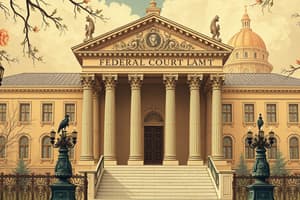Podcast
Questions and Answers
Which of the following best describes federalism?
Which of the following best describes federalism?
- A system of government operating under a monarchy
- A system where one government has full control
- A system where local governments are completely independent
- A system where multiple governments share control over the same territory (correct)
Adoption is considered a fundamental right.
Adoption is considered a fundamental right.
False (B)
What is the mootness doctrine in the context of American courts?
What is the mootness doctrine in the context of American courts?
The principle that courts will not decide cases with no actual controversy.
An injunction is a court order that commands or prevents a __________.
An injunction is a court order that commands or prevents a __________.
Match the legal terms with their definitions:
Match the legal terms with their definitions:
What is a key feature of the relationship between the federal courts and laws according to the Constitution?
What is a key feature of the relationship between the federal courts and laws according to the Constitution?
States are allowed to enact ex-post facto laws.
States are allowed to enact ex-post facto laws.
Explain the difference between an Originalist and a Non-interpretivist approach to constitutional interpretation.
Explain the difference between an Originalist and a Non-interpretivist approach to constitutional interpretation.
In federal court, a plaintiff must demonstrate that the challenged conduct has caused actual ________ and that the issue is protected by a statutory or constitutional guarantee.
In federal court, a plaintiff must demonstrate that the challenged conduct has caused actual ________ and that the issue is protected by a statutory or constitutional guarantee.
Match the following Supreme Court principles with their descriptions:
Match the following Supreme Court principles with their descriptions:
Flashcards
Federalism
Federalism
A system of government where power is shared between a national government and state governments.
Plurality Opinion
Plurality Opinion
A judicial opinion that receives more votes than any other opinion, but not a majority.
Writ
Writ
A court order instructing someone to do or not do something.
Remedy
Remedy
Signup and view all the flashcards
Mootness Doctrine
Mootness Doctrine
Signup and view all the flashcards
Constitutional Limits on Religious Displays
Constitutional Limits on Religious Displays
Signup and view all the flashcards
Ex Post Facto Laws
Ex Post Facto Laws
Signup and view all the flashcards
Advisory Opinions
Advisory Opinions
Signup and view all the flashcards
Justiciable Controversy
Justiciable Controversy
Signup and view all the flashcards
Originalism vs. Non-Interpretivism
Originalism vs. Non-Interpretivism
Signup and view all the flashcards
Study Notes
Federalism
- A system of government where power is divided between two (or more) levels of government within the same territory.
State Police Powers
- Building an army during peacetime is not an example of state police powers.
Plurality Opinion
- A judicial opinion receiving more votes than any other, but not enough to constitute a majority.
Writ
- A formal written order issued by a court, instructing someone to act or refrain from acting.
Remedy
- A means of enforcing a right or addressing a wrong.
Fundamental Rights
- Adoption is not considered a fundamental right.
Mootness Doctrine
- Courts will not hear cases where the issue is no longer relevant or there's no actual controversy.
Shared Powers
- The ability to levy taxes is a shared power between federal and state governments.
Stare Decisis
- Adhering to precedent, meaning courts follow earlier decisions in similar cases. It ensures consistency and predictability in legal rulings.
Nullification Doctrine
- The idea that states can declare federal laws unconstitutional and inapplicable within their borders.
Injunction
- A court order directing a party to perform or refrain from performing a specific action.
Implied Rights (Penumbras)
- Implied rights, not explicitly stated in the constitution.
Standing
- The legal right of a party to bring a lawsuit. A party must demonstrate an actual injury and the protection of a statutory or constitutional right.
Advisory Opinion
- A non-binding statement from a court on the interpretation of a law.
Political Question Doctrine
- Certain constitutional issues are better left to the political branches of government for interpretation and enforcement.
Purpose of a Constitution
- A constitution helps establish leadership and reduce conflict within a group.
Fragmented Court Decision
- A court decision where no majority opinion is reached, using the narrowest possible grounds for the decision.
Religious Symbols on Public Property
- Religious symbols on public property are not allowed if they promote a particular religion.
Ex Post Facto Laws
- States cannot create laws that retroactively punish actions.
Executive Branch and Article I
- Article I of the US Constitution does not establish the executive branch of government.
Advisory Opinions (Federal Courts)
- Federal courts are prohibited from issuing advisory opinions because a case or controversy must exist.
Case or Controversy Requirement
- Federal courts can only hear cases involving an actual dispute.
Plaintiff's Burden in Federal Court
- Plaintiffs in federal court must demonstrate actual injury and a constitutional or statutory right being violated.
Overruling Constitutional Precedent
- The court may sometimes choose to overrule constitutional precedent, but this is not automatic. Justification is usually needed.
Powers of Regional Governments
- Powers of regional governments (states) are the residual powers, not expressly mentioned in the constitution.
Originalism vs. Non-interpretivism
- Originalism: Focuses on the intentions and understandings of the founders when the constitution was written and adopted. (e.g. if a founder did X then it must be okay today).
- Non-interpretivism: Considers both the founders' intentions and contemporary context while interpreting the constitution. (e.g. considers the impact or societal norms have changed whether or not it was in line with the original founder’s intention).
Supreme Court's Authority
- The supreme court's authority derives from the constitution being the supreme law of the land and if the constitution contradicts a law then the law loses. The supreme court has the power to strike down laws that violate the constitution because if they didn't then the constitution would be flawed
Nonjusticiable Political Questions
- Courts do not have the authority/jurisdiction to hear certain political questions, as defined by the constitution.
Studying That Suits You
Use AI to generate personalized quizzes and flashcards to suit your learning preferences.




